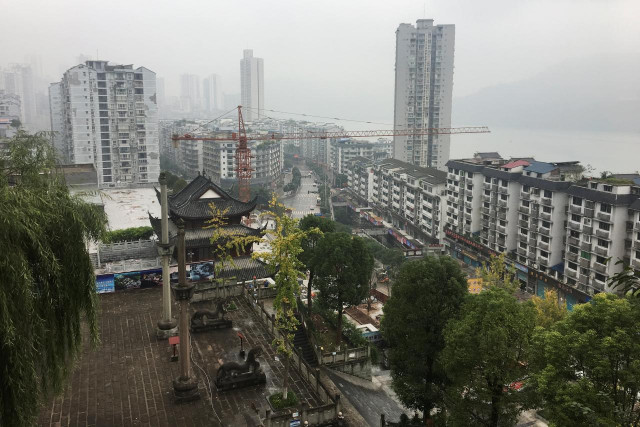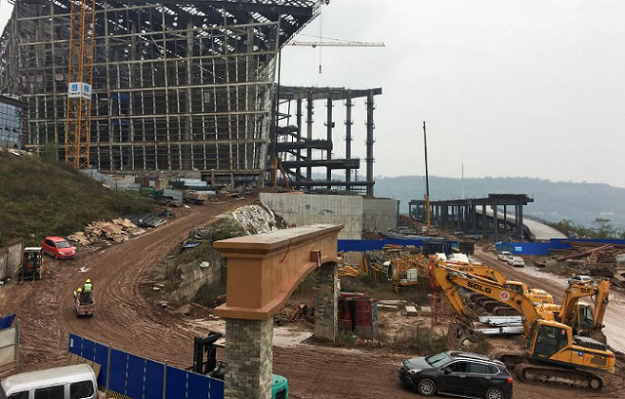E-sports to chocolates: Chinese cities rush into risky specialisation
Initiative might mean some long-term growth in neglected regions of country

A construction crane is seen in a general view of Zhongxian, Chongqing, China. PHOTO: REUTERS
But after a dispute with the local government over land rights, the developers pulled out and all that remains of the green-themed project are half-completed structures and piles of rubbish.
Now, Zhongxian’s government has seized upon another plan to reinvent its economy: a 1.4 billion yuan ($211.60 million) online gaming complex that it hopes will cash in on China’s fast-growing e-sports market.
When finished, the complex will include a 6,000-capacity stadium and an incubator for gaming start-ups - and this in a town that lacks an airport or railway station.
Bank of China opening expected to boost trade
Zhongxian, a hardscrabble city of one million people, is among a slew of towns responding to Beijing’s call to create 1,000 “specialty towns” by 2020.
The Chinese government is hoping to spur the development of sustainable economies around local industries in the hinterland, but the plan also underlines the challenge it faces in trying to rein in risky debt undertaken by local governments.
Local governments have responded to the initiative by embracing a vast array of industries; cloud computing, chocolate-making, traditional painting and much more. Some projects involve new industries; others are based on promoting traditional ones, or developing tourist industries based on local natural attractions.
While the initiative might mean some long-term growth in neglected regions, economists are also concerned about a new buildup of the kind of risky debt that Beijing has been struggling to resolve, and result in more white elephant projects across the country.
A tale of two textile cities — one in China and one in Pakistan
China’s State Council Information Office, which doubles as the Communist Party’s communications arm, did not respond to a faxed request for comment.
Many of the specialty towns - like the one in Zhongxian - are also proceeding with projects before getting official approval, raising the risk potential, the economists say.
“On one hand, the plan can help resolve inequalities in regional development, but on the other, lots of people are taking specialty town funds and creating a fiscal mess,” said Gao Wei, a Beijing-based analyst at the Centre for China and Globalization.
China’s state planning authority, and the housing, land and environmental protection ministries, on Tuesday issued new guidelines for specialty towns, citing growing risks from local government debt and an over-emphasis on property development.
Guo Li, a Zhengzhou-based independent city planning specialist, calculates there are as many as 6,000 specialty towns in the works. Based on the typical announced investment of 3 billion yuan, Guo said, total investment may be about 18 trillion yuan.
Zhongxian raised funds through a proxy company set up by the city’s finance bureau, according to the company’s official registration information.
China says Indian drone 'invaded' its airspace, crashed
Such companies – known as local government financing vehicles - can be used to skirt restrictions on borrowing by local governments. However, regulators have raised concerns about the system’s lack of transparency.
Other specialty towns have turned to the so-called public-private partnerships preferred by Beijing, drawing investment from private companies. However, the authorities have expressed concerns that some local governments are using the partnerships as “disguised channels” to increase debt.
Rejuvenating the hinterland
Plans to rejuvenate the comparatively poor hinterland and narrow a divide with prosperous coastal regions have mushroomed under President Xi Jinping, who is ratcheting up pressure on local officials to find equitable, cleaner and more sustainable drivers for China’s slowing economy.
Xi added fresh impetus to those rebalancing efforts when he said recently that the “principal contradiction” facing Chinese society was between “unbalanced and inadequate development” and the “people’s ever-growing needs for a nice life”.
His statement was seen by experts on Chinese politics as a significant policy shift that will push officials to focus on sustainable development in neglected areas and kick efforts like the specialty town initiative into overdrive.
 A construction site of an online gaming stadium is pictured in Zhongxian, Chongqing, China. PHOTO: REUTERS
A construction site of an online gaming stadium is pictured in Zhongxian, Chongqing, China. PHOTO: REUTERSDuring China’s manufacturing boom, a host of single-industry towns sprung up organically around factories, specializing in things like socks or Christmas lights.
The new specialty towns, by contrast, are government mandated and normally require approval from the provincial government and central entities, including the housing ministry and state planner. The towns are usually limited to a three-square-kilometer zone dedicated to the industry of choice.
In August, five specialty towns in Zhejiang province received warnings from the provincial economic planner for failing to meet targets on earnings, investment and innovation, according to media reports.
One was a “pet town” whose plans included making and selling dog houses, leashes and chew toys, as well as attracting tourists with a bone-shaped visitors center. The town failed to provide a high return on investment and spent too much on building shoddy local infrastructure, the reports said.
Reuters could not reach the Zhejiang government for comment.
Hopes and doubts
In Zhongxian, residents said they were hopeful the gaming complex would boost incomes and generate jobs.
Although the government has yet to apply for specialty town status, local officials say they are in the process of applying.
China is building first 'forest city' of 40,000 trees to fight air pollution
Yi Hui, director of the Zhongxian Cultural Committee, said the city had no set goals in terms of return on investment as the project was still in its early stages. Zhongxian seized upon the industry as one with great potential when considering new opportunities, he said.
The booming Chinese gaming industry was “for sure good for our economy”, he said.
Zhongxian’s stadium, due to open in December, will bring in rental income and ticket sales from future gaming competitions, Yi said. Zhongxian has won the right to host the grand final of China Mobile E-sports Games – a mid-tier competition backed by the General Administration of Sports – for the next five years.
China’s main e-sports events are usually held in cities like Shanghai. For Zhongxian, bringing in fans will be more difficult - the main public transport link is a three-hour bus ride away from downtown Chongqing, the closest major city. But Yi said shuttle buses would bring in visitors when the gaming stadium opened.
He said the city estimates the gaming town will help attract at least 3.6 billion yuan in new businesses and investment, as well as tourists.
One government-approved specialty town, Dingshu, on the shores of Lake Tai in Jiangsu province, is aiming for a dual approach: leveraging its history as a center for red-clay teaware, and developing a small-scale aviation industry on the side.
It has set up an industrial park that already has a company building small float planes on Lake Tai and one that makes aviation equipment. The city hopes to attract more aviation-related businesses and build an airport.
But the local government is pinning most of its hopes on Dingshu’s pottery industry.
A spokesperson from the government of Yixing, of which Dingshu is a district, said while the aviation industrial park was independent from the pottery specialty town, it was “icing on the cake” for Dingshu’s economic development.
Local residents said it was unclear how becoming a specialty town will help their pottery businesses and they worry about rising competition.
“As yet, I have not seen any change from Dingshu becoming a specialty town,” said one pottery seller surnamed Zhang.




1725099588-0/BeFunky-(41)1725099588-0-208x130.webp)














COMMENTS
Comments are moderated and generally will be posted if they are on-topic and not abusive.
For more information, please see our Comments FAQ